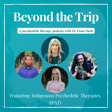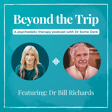
Dr Paul Liknaitzky: Future directions for Psychedelic Research
In this episode, I talk with Dr Paul Liknaitzky, Head of the Clinical Psychedelic Lab at Monash University. 🌱
We explore Paul’s journey into psychedelic science and therapy, challenges & opportunities in psychedelic rescheduling in Australia, The critical skills needed for psychedelic therapists, future directions for psychedelic research, and why collaboration is key in this space
Paul is Head of the Clinical Psychedelic Lab and a lSenior Research Fellow in the Department of Psychiatry at Monash University. He has played a central role in establishing the field of clinical psychedelic research in Australia and is the principal investigator on a program of psychedelic trials. He is involved in numerous psychedelic studies across the country and collaborates with many international experts and organisations in the field. He has led several world-first studies, including the first trial to use psilocybin in the treatment of a primary anxiety condition, the first study testing the utility of psilocybin as a therapist training tool, and the first trial testing a psychedelic-augmented virtual-reality treatment.
keep in touch with me at Insta: dresmedark
Linkedin: www.linkedin.com/in/dr-esme-dark-627156a0/
website: https://www.esmedarkpsychology.com.au/
Find Paul and Monash Clinical Psychedelic Lab at www.monash.edu/psychedelics
Disclaimer: This podcast if for general information only and does not constitute an endorsement or recommendation for psychedelic- assisted psychotherapy.
















